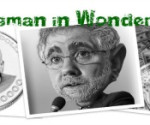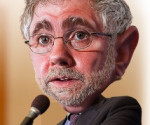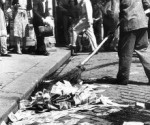Bailouts, Blunders, and Bad Policies – Krugman in Wonderland
While Paul Krugman’s column for May 2 is not exactly coordinated with the nearby editorial, “The Economy Slows,” there is correlation if one looks for it. For both Krugman and his editorial bosses, it is all about government magically “fixing” the economy by new spending, new regulations, and creation of new “money.”
Krugman is engaging in his usual political talking points, today excoriating the Republicans for what he claims is weakening of the new financial regulations, while the editorial writers bemoan for the umpteenth time that the economy, well, sucks. And if that were not enough, Krugman even reaches back to the hoary claims that this whole crisis came about because the Bush administration did not bail out…Lehman Brothers. Yeah, had the government just written a big, fat check for Lehman, all would be well today.
Now, I have no desire to get into the minute details of financial regulation, except to say that every regulatory initiative before has ended up creating cartels of people who ultimately have privileges above everyone else in the industry because of political connections. Economists have long established the unholy relationships between the regulators and the regulated, and while Krugman might persist in claiming that the Sainted Elizabeth Warren will “reinvent” regulation, here is betting that human nature wins (as it always does).
Furthermore, Krugman really wants us to believe that one of THE causes of the crisis was foreign exchange swaps. Good grief! Uh, can someone spell “H-O-U-S-I-N-G B-U-B-B-L-E, or did foreign exchange swaps create that crisis, too?
In the late 1970s, if one actually goes back and reads the financial literature of the time (as opposed to depending upon Krugman and his employer to give us an accurate depiction of that era), the push for deregulation was NOT ideological. The heavily-regulated banking “cartel” was struggling in the face of double-digit inflation, as people were taking money from low-interest bank accounts and putting money into highly-liquid money-market accounts that were coming into play and paying higher rates of interest than were the banks.
On the investment banking side, Michael Milken was pioneering high-yield and (supposedly) high-risk bonds (derisively called “junk bonds”) that were doing an end run around the regulated system that could not and would not finance a number of new high-technology ventures. (Krugman leaves out that point because it does not fit into his narrative.) Entities like MCI and CNN were among these firms Milken helped to finance.
Are you reading this on a cell phone? The banking cartel that Krugman claims was working just fine would not touch the new cell phone industry that turned to Milken and his investment banking firm. Yes, Milken was doing an end run around the regulated system and the banks wanted a piece of it. (And they got Rudy Giuliani, who had his own political aspirations, to go after him with bogus criminal charges — something admitted by one of Giuliani’s lieutenants in a speech to Rutgers University law students.)
I include these points because Krugman really believes that if we only could go back to the days when trucking, airlines, railroads, telecommunications, and financial institutions were “regulated” into tiny, neat cartels, that everything today would be just great. Well, if the old system that Krugman praises were in existence, we would not be reading this, as there would have been no Internet for Al Gore to have invented.
Why? Because we still would be routing telephone calls through strands of copper wire instead of using fiber optics, as the regulated firms did not want to have to switch to anything that would deprive them of their full depreciation write-downs for tax purposes. Oh, and long-distance calls most likely would be about a dollar a minute instead of, in most situations, zero cents.
But, Krugman and his employer really seem to believe that the way to revive this economy is to turn back the clock to the regulatory structure of the 1930s, as though shrinking the economy by creating new cartels (which, by definition, limit output) through regulation. Oh, and government would simply depend upon the Fed to create new money in order to try to hide the fact that the regulatory side of government is making the economy contract.
Funny, the NYT editorial complains that inflation is of the “cost-push” variety, which means that higher prices are the result of higher prices, which is a logical absurdity. But absurd is the new watchword today. Shrink the economy, print money, create new cartels, limit technology, and out of that will come an economic version of the Shining City on the Hill.
(Yes, I need to address what went wrong in the financial deregulation, and why the system ran into the ground. Needless to say, I believe that the history of the past 30 years is not as simple as the “good regulation, bad freedom” story that Krugman and his ilk are telling.)
Check out the “Krugman in Wonderland” posts here the Disptach – click here
William L. Anderson is an author and an associate professor of economics at Frostburg State University in Maryland. He is also an adjunct scholar with the Mackinac Center for Public Policy as well as for the Ludwig von Mises Institute in Alabama.
Read more at “Krugman-in-Wonderland”














